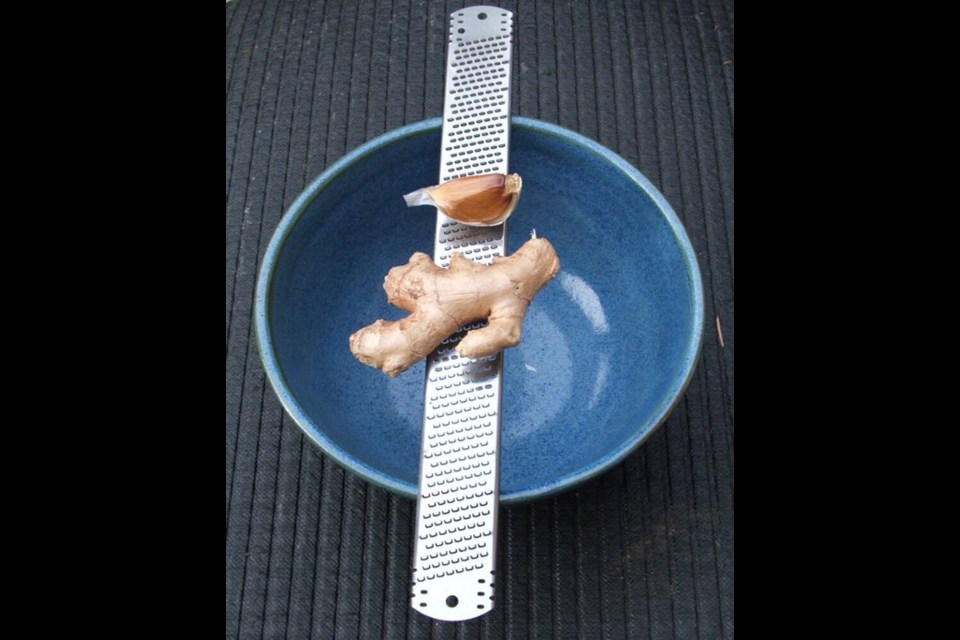Dear Helen: Is it just lore, or is it true that consuming garlic delivers real health benefits? I’m wondering too about ginger, and whether we can grow ginger for the edible roots in our gardens.
H.P.
The organic sulphur compound allicin in garlic is a significant health-boosing agent. It helps to reduce inflammation and has anti-bacterial and ant-fungal properties. Garlic is most beneficial in its raw form.
Only once in my life was I afflicted with a stubborn fingernail fungus. Nothing worked to dry it up until, one day, as I was peeling garlic cloves I happened to glance at the nasty nail. On impulse, I cut the garlic clove and rubbed the cut surface against the nail cuticle. That’s when the fungus began to disappear. With repeated applications, it was gone.
Over the holidays my son and I enjoyed green salads almost every day. The mashed garlic and ginger root I included in the dressings added zesty flavour and health benefits to the salads. To easily reduce both garlic cloves and pieces of ginger root to a moist pulp, I use a stainless steel wood rasp from Lee Valley Tools.
Ginger root, like garlic, has been used for thousands of years as a general tonic and protection against many different ailments. Its health-promoting properties are similar to those of garlic.
I’ve tried growing ginger from purchased roots that have begun to sprout. The sprouted parts, planted, produce leafy stems around one metre tall, but our growing season is not long and warm enough to produce useable roots. I’ve not yet tried bringing potted ginger plants indoors to keep them growing to the harvestable root stage.
Dear Helen: I am very fond of dill, and use it often in salads and cooking. I prefer to have my own fresh dill in the garden during the growing season, but I have limited room in my boxed plots and dill grows tall and takes considerable space. Are there any dwarf varieties?
S.K.
There are compact varieties of dill. Fernleaf seems to be the most commonly available one. It is currently listed by T&T Seeds and William Dam seeds. The bushy little plants grow to about 40 cm tall, and are well suited for growing in containers and at corners of raised beds.
The last time I consulted the West Coast Seeds website it indicated that Fernleaf and another dwarf dill called Ella were not yet available but “coming soon.”
Compact varieties of popular vegetables, herbs and flowers are much in demand in today’s small-space and container gardeners. Dill is a commonly used herb with soothing properties. It has traditionally been considered a digestive aid.
Dill adds interest and flavour to fish dishes and salads, especially cucumber and potato salads, and in yogurt-based sauces. A gardeners’ late spring and early summer treat is steamed “new” potatoes topped with butter, salt and finely chopped dill.
Dear Helen: By this time I usually have received at least a half dozen of the new seed catalogues. Only two have arrived. I’m wondering whether this is your experience.
N.A.
I, too, was wondering why so few catalogues had arrived by late December. Then a seed company that sends me regular notices included this in a pre-Christmas email: “Due to a global paper shortage, there is a delay in printing our catalogue.” That shortage has likely affected most companies that issue printed catalogues.
Before Christmas, I’d received only one catalogue. Two more came on Dec. 31. I did notice, at a garden centre close to me, that full racks of West Coast Seeds were already on display just before Christmas, when I dropped in to pick up a poinsettia for the kitchen. I know catalogue shopping is fun, but buying seeds at local outlets is a handy alternative that supports local businesses.
Seed and garden companies have online catalogues. Using them will be a bit of a hurdle for gardeners reluctant to engage in online financial transactions, but it is what most people are doing. Fewer and fewer people are mailing in seed orders using a printed catalogue.
If you know what seeds you want, and have access to a computer, you’ll find that most companies make ordering fairly simple. For safety in the transaction, I use a charge card with a low limit on it.



